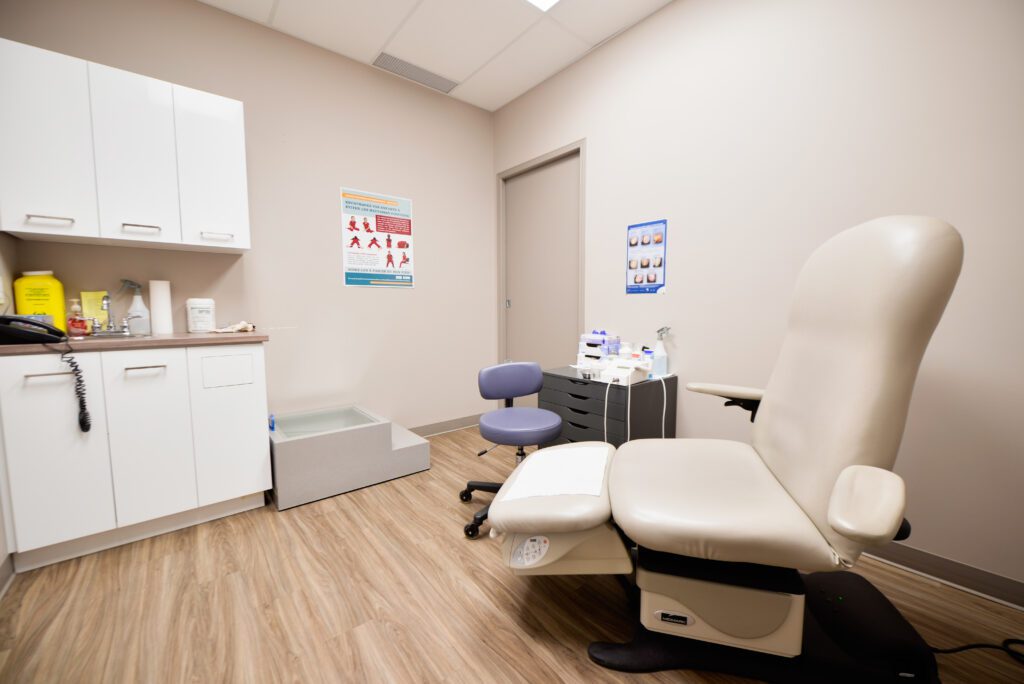
As a doctoral student in podiatric medicine in 2010, Dr. Caroline Descôteaux, Podiatrist, began her practise in Quebec City before acquiring the Drummondville clinic.
Dr. Marc-André Héroux, Podiatrist, trained in podiatry and microbiology, which allows him to analyze the anatomy, physiology and pathologies of your foot. This ensures you benefit from the best diagnosis possible.
The newest addition to the Drummondville clinic is Dr. Jany-Ève Allard, a podiatrist. She rounds out the trio and uses her knowledge of podiatry medicine to care for you in the most effective way. You can rely on the best possible follow-up to alleviate your foot problems and get back to your daily life.
Drummondville podiatry clinic
350 Rue Saint-Jean #140, Drummondville, QC J2B 5L4
1-819 473-8400 Toll free
Tuesday : 8:30 - 19:00
Wednesday : 8:30 - 19:00
Thursday : 8:30 - 17:00
Friday : 8:30 - 16:00
A personalized approach and a dedicated team
The Clinique podiatrique de Drummondville welcomes you to its professional, friendly and caring environment. And we treat you as we would a member of our own family.
The dedication of podiatrists Caroline Descôteaux and Marc-André Héroux allows you to alleviate your foot pain in the most effective way possible. These professionals also know how to explain your condition in a straightforward way so that you can easily understand.


Frequent problems
Drummondville podiatry clinic : pain : foot, ankle, leg, knee, hip and lower back
Did you know that this type of pain is often related to unbalanced feet and legs?
Foot pain is very common, and often localized in the heel. The most common heel pain is plantar fasciitis. The forefoot is also often a source of pain. This pain is usually located on the soles of the feet just behind the toes. The term “metatarsalgia” encompasses the majority of these pains, which can then be more specifically classified according to the area affected and the source of pain or discomfort. Morton’s neuroma, hallux abducto valgus (foot bunion) and hammer toes are some of the most common disorders of the forefoot. The condition that affects the top and central portion of the foot often results from osteoarthritis. This osteoarthritis is normally the wearing down of the joints caused by a misalignment of the foot.
Ankle pain can be caused by an old injury such as an improperly healed sprain or fracture and/or a functional foot problem. The onset of...
Drummondville podiatry clinic : ingrown toenail (onychocryptosis)
Ingrown toenails are a frequent nail issue that can be extremely painful and even incapacitating. It's identified by a toenail that grows into the flesh and punctures it.
Ingrown toenails cause irritation and, in the worst-case scenario, infection, resulting in painful toes.
As a result, it is critical to address the problem as soon as possible in order to prevent the situation from spiralling out of control.
Let's look at the causes, symptoms, and remedies for ingrown toenails.
An ingrown toenail can be identified by a variety of symptoms. Inflammatory redness, pain when squeezed, and, in some circumstances, blood or pus on the side of your nail are all possible symptoms.
However, keep in mind that an ingrown toenail has three stages;
- First stage: there is a small inflammation and pain when pressed.
- Second stage: we observe an infection and the wound becomes more visible.
- Third stage:...
Drummondville podiatry clinic : plantar warts: causes, symptoms and treatment
A viral infection is what causes a plantar wart, which is a skin lesion. It can either stay dormant for years or develop and spread quickly. It's a contagious skin condition that affects you and those around you.
The HPV, or human papillomavirus, creates these lesions. Despite the fact that it is a harmless virus, it is recommended that you get treatment as soon as possible to get rid of it.
The plantar wart frequently appears as a tiny, rough, spherical, and flat lump. It will manifest itself in a variety of ways.
- Appearance: it consists of spongy, brownish or yellowish tissue with small black dots;
- Size: it can measure from a few millimeters to several centimeters in diameter;
- Pain: plantar warts can be painful, even though they are uncommon. Friction or a pressure point can produce this type of pain, which can become severe;
- Posture problem: the foot pain caused by the plantar wart can lead to a foot positioning...
Drummondville podiatry clinic : diabetic foot : symptoms and treatments
Diabetic foot develops as a result of the neuropathy that comes with poorly managed diabetes. When blood sugar levels are excessively high for an extended length of time, it impairs a person's neurological system.
The injury results in a lack of sensation in the lower limbs, among other things. Peripheral neuropathy is the medical term for this condition.
Blood vessel constriction is also caused by poorly managed blood sugar levels. Wounds and ulcers form more easily and heal more slowly as a result of inadequate circulation.
If left untreated, these two factors explain the dangers of a diabetic foot. A diabetic foot sufferer may have trouble recognizing a wound or a temperature change. As a result, individuals may be unable to discern between discomfort that requires the attention of a podiatrist or other health care provider.
Diabetic foot is a severe disease that can lead to gangrene and, in the worst-case scenario, amputation. That's...
Drummondville podiatry clinic : corns, calluses and severe corns
Corns, calluses and severe corns are formations of dead flesh under the feet. They can be embarrassing for people when they walk or exercise.
Often, people with delicate feet tend to suffer more. However, this foot problem is easily treated.
It is common for an individual to develop skin problems. However, it is important to know the difference between the 3 pathologies described below.
- Corn: this is a localized area of skin that thickens a lot. When a cluster forms, it bores into the skin and causes pain similar to that of a pebble in a shoe.
- Callus: a corn has several names, like callosity or hyperkeratosis. It is characterized by an accumulation of excessive layers of skin and can form cracks in the heel if not treated.
- Severe corn: these are also corns, but in their case, they are more advanced. They are painful, with a brownish center. They develop because of excessive pressure on the skin that has thickened,...
Drummondville podiatry clinic : plantar fasciitis: causes, symptoms and treatments
Plantar fasciitis is a common foot condition. A strain or break in the plantar fascia, the fibrous band that supports the arch of the foot, is at the root of this condition.
Heel discomfort is the most prominent sign of this condition. It will be felt from the first steps in the morning or after a lengthy period of sitting.
You can find plantar fasciitis symptoms, causes, and remedies are listed below.
A person with plantar fasciitis will feel discomfort when they first walk in the morning, but it will subside over the day. They will also experience discomfort after sitting for an extended period of time.
Plantar fasciitis can also cause the following symptoms:
- Pain when palpating your arch or when pressing on your heel;
- Standing or walking causes pain, which might worsen over time;
- Tension on the outside of the foot, which can cause compensating foot and leg discomfort;
- A condition...
Treatments provided
Drummondville podiatry clinic : plantar orthotics: types, benefits, and adaptation tips
The primary goal of plantar orthotics is to improve the function of your foot in order to correct various biomechanical flaws or posture issues. They are used to compensate for certain deficiencies in your foot. Because they are custom designed specifically for your condition, the orthosis is perfectly adapted to the shape of your foot to optimize its function.
In addition to relieving any pain you may experience, a custom-made foot orthosis is adapted to the morphology of your feet, and redistributes the pressure exerted on them. It can therefore be used to treat many pathologies and deformities. Remember that the health of your feet is important to be able to perform your daily activities.
To ensure your orthotics treatment provides effective results, the podiatrist will have to evaluate you and design a custom casting of your feet. You will be cared for during all stages of the process, to ensure you receive the correct orthosis, which you can...
Drummondville podiatry clinic : cortisone injections
Cortisone injections, sometimes referred to as “cortisone infiltration,” are often a beneficial podiatry treatment used to relieve acute or chronic pain related to various musculoskeletal issues. Actually, cortisone is a hormone frequently used as an anti-inflammatory to relieve certain joint pains, rashes, inflammation or swelling.
Learn more about cortisone injections, an effective treatment with numerous benefits, but which must generally be used in the short term, with care and discernment, by a healthcare professional.
Drummondville podiatry clinic : ingrown toenail treatment by a podiatrist
An ingrown toenail (onychocryptosis) is an inflammation caused by a portion of a nail (usually on the big toe) penetrating the surrounding skin.
While usually minor, it is nonetheless a common nail problem that can result in pain and inconvenience in your daily life. If the ingrown toenail is not treated, it may lead to inflammation and exacerbate the pain in the foot.
Do not worry, however, as there are a variety of useful therapies available to help you get rid of ingrown toenails and get your feet back on track. Learn more in this article.
Medical nail clipping is one of the most traditional nail care procedures. Nail clipping is a common solution for ingrown toenail problems that is performed by a podiatrist or a specialized nurse (assistant). Professionals in the field of foot care can customize a cut to your nail's condition.
Nail care, on the other hand, is more than simple nail trimming, as antibiotic creams or baths can...
Drummondville podiatry clinic : a podiatrist’s treatment for plantar warts
Plantar warts are common skin lesions that can be quite unsightly. They are often harmless, although they can be infectious and unpleasant.
In reality, these growths on the foot might cause bleeding or create other issues such as irritation, pain, or infectious cellulitis in the long run.
Furthermore, if you are diabetic, elderly, or immunosuppressed, your plantar warts are more likely to cause problems.
Fortunately, plantar warts may be treated in a variety of ways to reduce the risk of infection and consequences. Let's have a look at those.
Your podiatrist can write you a prescription for painless wart treatment at home. The majority of these medicines are used topically.
Prescription medication care can:
- Treat plantar warts at home;
- Treat plantar warts completely painlessly.
However, this type of treatment...
- Is usually longer lasting;
- Must be...
Drummondville podiatry clinic : foot care – nails, corns and calluses treatment
Performed by a podiatrist, foot care includes many treatments and assessments aimed at preventing pain, reducing restrictions and promoting comfort. They can even be performed at home by a specialized caregiver.
A versatile professional, the podiatrist uses a variety of treatments to the benefit of your feet:
- Physical treatments;
- Pharmacological treatments;
- Orthopedic treatments;
- Surgical treatments.
A number of cases require foot care to be performed in a professional clinic. Therefore, the podiatrist and their team can provide you with a complete service to prevent and treat your foot pathologies. Naturally, all of this is done with clean, sterilized equipment.
Read on to learn more about the different treatment options.
Among the common foot treatments performed in podiatry you can find:
- The application of special creams;
- The prescription of...
Drummondville podiatry clinic : evaluating children’s feet
Having your children’s feet evaluated by a competent foot care professional will ensure proper management of any foot pathology that may worsen over the years.
Thus, when taken care of early enough, it is possible to improve your child’s postural development by evaluating and correct any foot issues for the rest of their lives!
Drummondville podiatry clinic : biomechanical exam : symptoms and treatments
Comprehensive biomechanical examinations are carried out in a podiatric clinic in order to make an accurate diagnosis of your condition. It is thus possible to establish the best possible treatment plan. During your visit, podiatric doctors who provide advanced expertise will evaluate you.
A complete examination done in a podiatric clinic includes:
Drummondville podiatry clinic : foot ultrasound imaging
A musculo-skeletal ultrasound of the foot is a medical imaging technique used to examine pathologies that affect soft tissues such as ligaments, tendons, nerves and muscles. Complementary to the clinical examination, a foot ultrasound provides an accurate diagnosis and is used to design a more structured treatment plan for patients.
A foot ultrasound is an imaging technique that does not use radiation, and is completely safe. Children, adults and seniors can all benefit from this service, regardless of their physical condition.
Easily administered, a foot ultrasound provides results almost equivalent to those of an MRI, ensuring rapid diagnosis and management of the condition.
Drummondville podiatry clinic : ultrasound guided injection
Ultrasound-guided injection can be used to deliver treatment directly to the affected area.
It may contain an anti-inflammatory solution, similar to the cortisone injection in the foot.
Ultrasound-guided injections, however, are more typically utilized to guide a medical practitioner during surgery on minor foot structures.
This type of infiltration not only relieves pain in pathologies including osteoarthritis of the big toe, plantar fasciitis, Morton's neuroma, and other plantar ailments, but it also allows for viscosupplementation and hyaluronic acid injection into particular joints.
This treatment offers pain alleviation that is both effective and safe.
Discover what makes this modern process unique, as well as how it can be beneficial for you.
Podiatrists can work safely and efficiently with ultrasound injection.
Although such a guiding device is occasionally required for cortisone injection in the...
Drummondville podiatry clinic : therapeutic laser treatment
Minimally invasive and highly effective, the therapeutic laser is a modern treatment for foot pain.
The laser treatment performed in the clinic relies on technology that thoroughly heals the damaged tissue through photobiomodulation.
This method accelerates the body's natural healing process, similarly to ShockWave therapy.
The therapeutic laser treatment provides relief from chronic pain, acute pain as well as post-surgery complaints.
This treatment uses safe beams of light, also known as high-power laser therapy.
When these light beams hit the skin, they penetrate the structures at the surface. Adding slight pressure may also allow the laser to reach deeper into the affected tissues.
Once they have penetrated the epidermis, the beams of radiation that reach the tissue are absorbed by melanin and hemoglobin.
As a result, the patient feels almost immediate relief when this energetic phenomenon is then...
Drummondville podiatry clinic : nail culture : importance, advantages and procedure
Nail culture consists of taking nail and skin fragments from under a nail that appears to be affected by a fungus.
The main purpose of this procedure is to rule out a diagnosis of various pathologies comparable to fungal toenail disease.
Examples include eczema or psoriasis, which may have similar symptoms but do not require the same treatment as onychomycosis.
Minimally invasive, nail culture has many benefits.
One of these is to facilitate the detection of a fungal foot infection that is difficult to treat if not treated early.
Learn how nail culture fits into the podiatrist's arsenal of diagnostic tools and how it can help in selecting the right treatment for you.
Some symptoms of nail fungus are similar to other skin infections such as psoriasis and eczema when left untreated.
The following symptoms are similar to those of nail fungus and are sometimes observed in patients with...
Drummondville podiatry clinic : therapeutic foot taping
Therapeutic taping consists of adhesive bandage that is strategically applied to specific areas in order to increase muscle tone or reduce pain associated with certain movements. Contrary to popular belief, therapeutic taping helps more than just for athletes.
While its use is widespread among runners and tennis players, therapeutic taping is also suitable for the general population. It is efficient for relieving very specific joint and muscle pain, however therapeutic taping cannot be applied just anywhere at random.
That's why it's important to trust a qualified professional such as a podiatrist to perform the taping. If you have been struggling with muscle pain or tension for some time, therapeutic taping may be right for you.
Taping is often used in addition to physiotherapy and plays a therapeutic role for many people.
This comes in 3 types: athletic taping, neuro-proprioceptive taping and finally therapeutic or compressive...
Drummondville podiatry clinic : manual foot therapy : personalized treatment plan
Podiatrists are trained to perform foot mobilizations. They are able to perform an articular evaluation of your feet as well as any symptoms felt. Following this evaluation, the podiatrist designs a personalized treatment plan to improve the articular architecture of your feet.
The podiatrist performs gentle and precise foot manipulations to help improve your feet’s functioning and alleviate your pain. You will thus benefit from optimal biomechanics. Your feet will be better adapted to your daily activities: walking, running, golf, etc.
Drummondville podiatry clinic : 2d and 3d digital imaging
Foot digitization consists of capturing the imprint of the feet using various devices to establish an accurate diagnosis. This technique is particularly useful when it comes to designing custom-made plantar orthotics.
2D impressions are taken using a podograph. A kind of pressure-sensitive cushion, a scan or a mirror, the podograph detects and shows a perfect image of the foot's plantar surface.
On the other hand, the 3D scanning method requires the contribution of a three-dimensional sensor. It can accurately reproduce the entire morphology of the foot.
These scanning methods make it possible to conceptualize the foot and determine the source of discomfort extremely rapidly.
For the podiatrist, taking an imprint is both a diagnostic measure and a solution for creating highly sophisticated foot orthotics.
In addition to creating high-precision orthotics, foot scanning plays a key role in understanding postural...
Dre Caroline Descôteaux podiatrist
Since graduating in 2010, podiatrist Dr. Caroline Descôteaux has been practicing her profession while working alongside her colleague Dr. Marc-André Héroux, podiatrist at the Drummondville podiatry clinic.
Caroline Descôteaux, DPM, is perpetuating the values of professionalism and respect which have made her successful since 2010, with therapeutic interventions aimed at a personalized approach.
A podiatrist who knows how to adapt
Podiatrist Dr. Descôteaux is equipped to offer a complete spectrum of foot treatment with her doctorate in podiatric medicine from the Université du Québec à Trois-Rivières.
During her time at the New York College of Podiatric Medicine, she had developed her skills in orthopedics, podiatry and foot surgery even further.
Dr. Descôteaux, podiatrist, is a dedicated podiatrist and is eager for continuous education to stay up to date on best practices.
She also serves as inspector for the Order of Podiatrists’ Professional Inspection Committee which motivates her to pursue more specialized training to fulfill this leading role.
When working with her patients, she puts this knowledge into practice.
For instance, by personalizing her approach, she can accommodate people with functional constraints (road accidents, handicapped people, etc.).
Caring and supporting
Caroline Descôteaux’s interventions provide evidence to her willingness to adapt to every individual. Her high flexibility has made her a talented practitioner, always ahead of the needs of her patients.
By ensuring that everyone is best prepared for podiatric therapy, podiatrist Caroline Descôteaux significantly improves her hospital’s quality of care.
Dr Marc-André Héroux podiatrist
Dr. Marc-André Héroux, podiatrist, has worked in the Drummondville podiatry clinic for many years and holds a Doctorate in podiatric medicine from the UQTR. He was able to consolidate the range of his expertise by sharing his time between his present clinic and Mauricie’s podiatry clinic.
Dr. Héroux is a podiatrist who specializes in biomechanical and postural problems, for which he is frequently sought out by athletes.
From pupil to teacher
Despite a traditional university education that would culminate in an internship at the prestigious New York College of Podiatric Medicine, Dr. Marc-André Héroux is constantly hungry for new information.
As a result, he got manual foot therapy training in addition to his internship, teaching him the active release technique and foot mobilization technique.
Having this sort of skill allows him to offer a variety of benefits, such as:
- Promoting faster healing of the affected limb;
- Improving your range of motion;
- Reducing muscle tension;
- Increasing the elasticity and suppleness of the muscle fibers and scars of the foot.
Podiatrist Dr. Héroux is also qualified to treat athletes in addition to his regular patients.
He may be relied upon to offer foot orthoses customized for certain activities, such as figure skating and skiing, thanks to his expertise as an enthusiastic athlete himself.
His biomechanics and manual therapy-based practice has prompted him to design a specific manual therapy course for his fellow podiatrists in Quebec.
Holding everyone’s well-being dear
Marc-André Héroux, DPM, like his colleague, podiatrist Caroline Descôteaux, promotes principles of respect and adaptability to each patient’s circumstance. In addition to his work as a trainer, he is committed to promoting healthy living choices in his community.
All in all, podiatrist Marc-André Héroux’s experience and thoroughness make him an ideal ally in the treatment and follow-up of your foot problems.
Dre Jany-Ève Allard podiatrist
Holding a doctorate in podiatric medicine from the University of Quebec at Trois-Rivières (UQTR), podiatrist Dr. Jany-Ève Allard employs her expertise to treat the people of Drummondville. She has returned to her hometown as a podiatric professional and joined the Drummondville podiatry clinic shortly after her graduation in June 2018.
An active podiatrist dedicated to her patients
Passionate, rigorous and dedicated, podiatrist Dr. Jany-Ève Allard relies on the most comprehensive training to treat various foot pathologies. Like many of her fellow professional podiatrists, she has completed an externship in podiatry at the renowned New York College of Podiatric Medicine.
Jany-Ève Allard, DPM, developed several areas of interest in her practice throughout her education. She is particularly interested in foot dermatology, more specifically in the context of diabetic wound care. As a former figure skater and very active person herself, she also enjoys applying her practice to sport-related cases.
Naturally, podiatrist Dr. Allard is also responsible for treating a multitude of other patient types. In particular, she cares for many elderly people in the city of Drummondville and has the necessary expertise to meet the needs of all sorts of clients.
Involved in many projects
Podiatrist Jany-Ève Allard is a person brimming with energy. Her mind is full of projects to improve her practice and make a difference in her community. Among these projects is an upcoming master’s degree in research, which would allow her to push her knowledge to new heights.
In addition, Dr. Allard also aspires to become either a teacher or a lecturer at UQTR in order to transmit her passion to the next generation of podiatrists. Until then, this tireless professional will continue to perfect her practice all while getting involved in sporting events like the Tremblant half-marathon.
Passionate and dedicated, podiatrist Dr. Jany-Ève Allard is an invaluable ally when it comes to treating your podiatric problems in Drummondville and the surrounding area.
MAKE AN APPOINTMENT
Responsible for personal information/confidentiality: Caroline Descôteaux 819-478-1060
Request an appointment at the clinic
Leave us your contact details and availability and we will contact you to make an appointment.





